Rakiya Abdulmalik is a hairdresser in Kawo community of Nasarawa Local Government Area (LGA) of Kano State. The 38-year-old mother of four was diagnosed with hypertension five years ago while pregnant with her fourth child, and since then, the entire process of managing the disease has been both time consuming and expensive. Each time she had to refill her prescription, to avoid the long waiting lines in the government hospital, she’d opt for “just any medication” from the patent medicine store in her community.
But this came at a cost as her blood pressure was neither monitored, nor was the right medication given to her. “I’d just tell the shop owner to give me hypertension medication, and he would give me any one,” she said. Abdulmalik had constant headaches and frequent dizzy spells, which she believed were due to her hypertensive condition. But she had to endure she said, as going to the hospital every month was “just too expensive”.
Relief came in June 2019, when she was approached by Hannatu Bello, a registered nurse who lived in the same community. Bello offered Abdulmalik an opportunity to both monitor her blood pressure and have her monthly refill of medications delivered to her shop. Abdulmalik accepted and since then, “life has been better. No more headaches and every week my blood pressure is measured, and I get advice on the foods I should avoid. I feel well now,” she said.
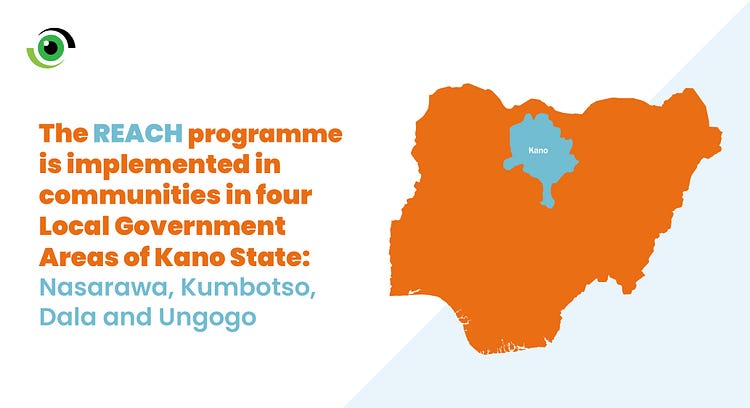
Taking quality healthcare to the people
Bello is one of 22 trained health workers providing healthcare services to community members in four LGAs of Kano State, under a programme called REACH implemented by EHA Clinics. REACH stands for “Reaching Everyone with Accessible Community Health”. The programme provides preventive and curative healthcare services to community members through a community-based health insurance initiative tagged the REACH membership Scheme. The scheme has both individual and family coverage.
Under the subsidised plan, the individual pays N1,050 which enables them access the full range of services. The “Youth Standard Plan” allows individuals to pay N750 per month and this can similarly be subsidised to N450. This plan provides free consultations and tests, as well as access to subsidised treatment.
For individuals above 19 years of age, a premium of N1,800 is paid under the standard plan and N1,000 under the subsidised plan. Both plans come with consultation, counselling, testing, and treatment at any time of need. Under the family coverage, a family of two adults and two children will pay N800 per month for the family subsidised plan and N1,500 for the standard coverage. However, all community members within the programme catchment area can access free consultations and subsidised medications even if they are not under any of these packages.
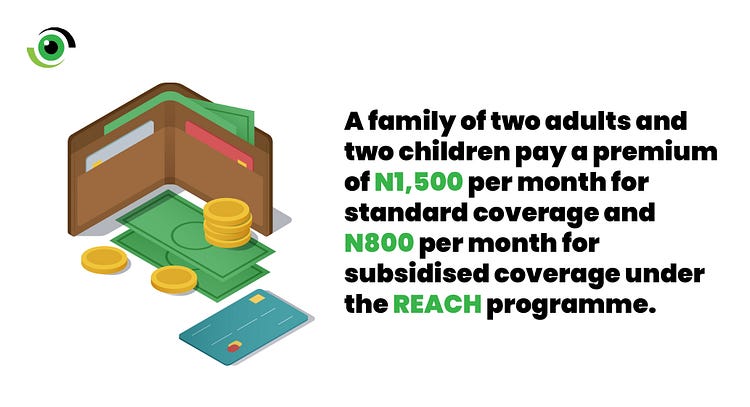
The REACH programme provides care for all ailments; from common diseases like malaria to chronic conditions such as hypertension and diabetes. Every health worker is trained and provided with equipment to conduct rapid diagnostic tests for malaria, typhoid, HIV, blood sugar, hepatitis B and C, sickle cell and measuring blood pressure and pulse rate. In the event of an emergency, where an individual requires specialised services, they are referred to EHA clinic in Kano or the Aminu Kano Teaching hospital (AKTH).
Services at affordable prices
“The whole aim is to get quality, affordable and accessible care for the people”, says Paul Hogan, the chief operating officer of EHA hospitals. To achieve this, the REACH programme has partnered with more than ten local and international pharmaceutical companies to supply medications at competitive prices. This, according to Hogan, serves as a form of corporate social responsibility for the companies. “We are not after profit, if people will get the care they need when they need it, we are satisfied,” he said. He added that the programme which started in May 2019, has grown to the point where it can now pay the salaries of all staff working under it. But EHA Foundation, the non-profit arm of EHA Clinics still covers a percentage of the cost of medications and consumables. Hogan is however optimistic that the programme will be able to cover its full cost soon. “We provide services to over 11,000 people presently. We expect to break even by the first quarter of 2022,” he concluded.
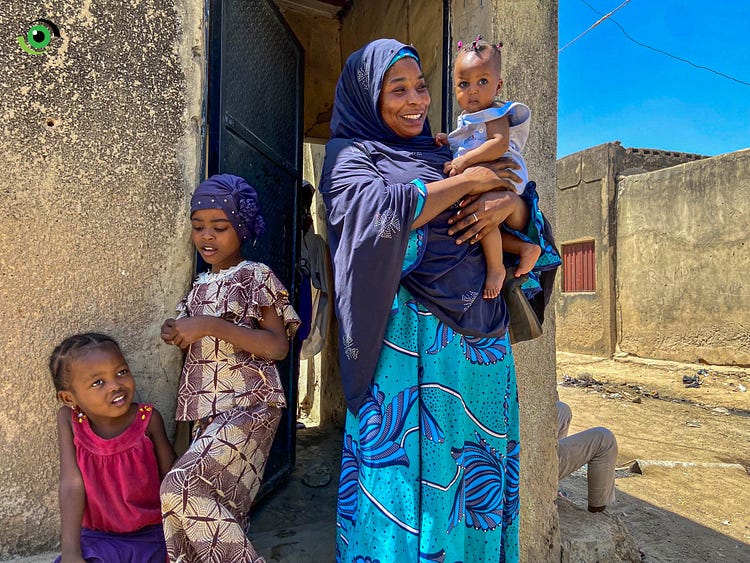
Detecting illnesses and saving lives
Habiba Umar is mother of 45-year-old, Maryam Haruna. They are both hypertensive and receive routine blood pressure check-ups and counselling visits from Fatima Atiku, one of the health workers under the REACH programme. Haruna lives two blocks away from her mother, and so they both decided to visit Fatima Atiku together when they enrolled and were placed in the subsidised individual plan, due to their economic status.
While Habiba, 65, has been hypertensive for over 10 years and until her enrolment in REACH received her medication irregularly, Maryam was diagnosed in June 2019. “I was having severe headache and swellings on my feet and was always feeling tired but feared going to the hospital because of the money,” she said. On observing Maryam’s condition, Fatima Atiku referred her to Dr. Zayyad Farouq, the medical supervisor of health workers under the REACH programme. After some tests, Dr. Farouq diagnosed Maryam with both hypertension and kidney complications. “She must have been hypertensive for a long time without knowing, and her kidneys were affected as a result,” Dr. Farouq explained. Both Maryam and Habiba now receive blood pressure checks and counselling two times a week, as well as monthly refills of their medications. Additionally, Dr Zayyad regularly monitors Haruna’s kidney functions.
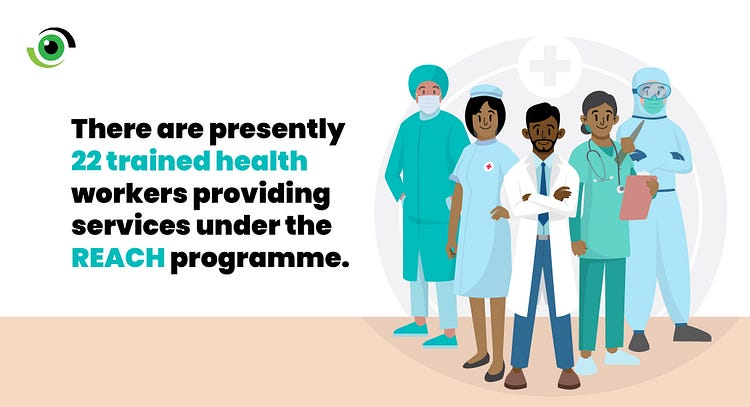
Affordability is key
Health insurance, especially community-based health insurance which covers the informal sector is a strong catalyst to achieving universal health coverage. However, affordability has always been one of the impediments to successful uptake of health insurance and this is more so in Nigeria, where more than 40% are living below the poverty line. As such, one of the limitations of the REACH programme could be the cost, as N1,800 per month for standard care could be out of the reach of most community dwellers especially those under 19 years of age who are most likely not earning a living. So also, is N1,500 per month for some families, who have competing demands like food and education. In addition, using 22 health workers to provide services to more than 11,000 people could be too tasking, as the health workers could be overwhelmed, and the people may not receive as much attention and care as they need.
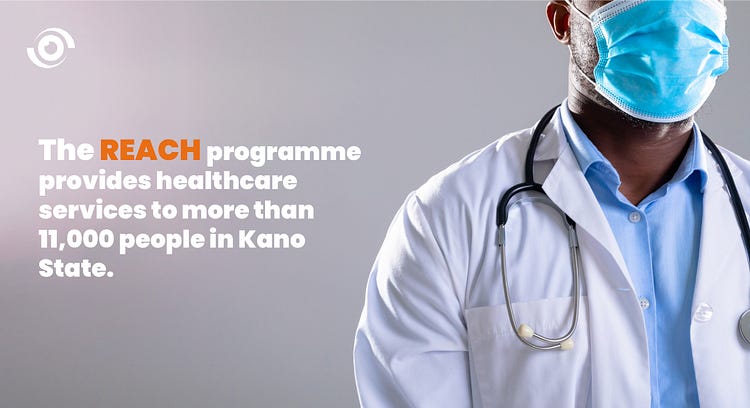
As the REACH programme prepares to expand to more communities and more states across the country, the financing model for the health insurance premiums for the different packages needs to consider affordability, especially in rural communities outside state capitals, where unemployment and poverty is high. Premiums should be capped within an affordable range and subsidies offered for low-income households. The programme could also partner with state governments, local government councils and philanthropists to cover the premiums of the poorest of the poor in communities. For now, people like Abdulmalik, Maryam and Habiba are receiving the care they need and as a result, have the possibility of living healthier lives.



A very progressive initiation. More of such is expected across the northern part of this country.
This is Avery visionary and with a good leaders , in this organization eg my mentor Alh, Tanimu Marafa .
My advice let engage some of expert in community health care now retired and are on ground and I believed. They will contribute a lot
This very Nice and organized NGO, but only it’s operate in kano why not in other state?.